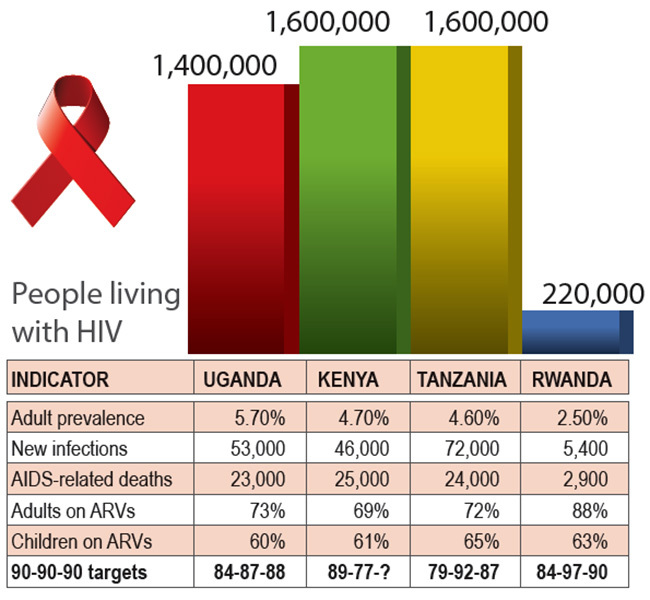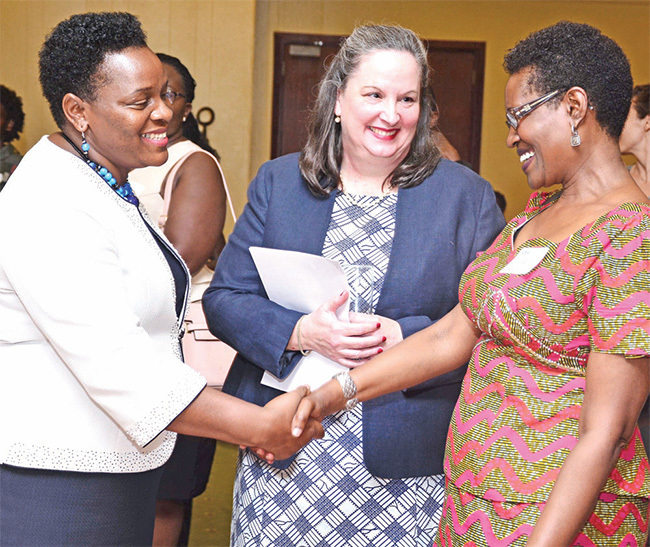Byanyima tips Uganda on winning HIV/aids fight
Dec 12, 2019
We know, for example, that there are 1.4 million people in Uganda living with HIV and out of these, 1.2 million people know their status and one million are on treatment.

HEALTH HIV/AIDS
Uganda honours World AIDS Day today, celebrating her special contribution to the world in top leadership of HIV management. This year, our very own, Winnie Byanyima, became the new executive director of the United Nations Programme on HIV/ AIDS (UNAIDS). Umaru Kashaka spoke to her about her new role and how she sees Uganda in it.
Uganda is proud to have you as executive director of UNAIDS. How do you feel about being the first Ugandan to hold that office?
I do not believe in firsts. I am not conscious when I am the first; it is other people who notice, but for me, it is a new role. It is an exciting journey. I am excited about the possibility of ending AIDS by 2030 and joining an organisation of passionate and experienced people, as well as working with them to support a global response that may get us to the finish line.
While it is a national honour and opportunity for a Ugandan to serve at that level, is it not a challenge for you and Uganda to shine in such an illuminated position?
That is true. I have been honoured, but I have also been challenged. I have to care for the teams all around the world, empower them, enable them to be creative and to work at their best. I have to work with them to guide the world on how to end this pandemic by 2030. So, I do not underestimate the challenge.
You have taken up this position when Uganda is performing well. New infections dropped to 53,000 last year, HIV-related deaths decreased to 23,000 and about 75% of people who need ARVs are getting them. Against UNAIDS' 90-90-90 strategy, Uganda is at 81-89-78. Are you happy with the HIV performance?
Uganda has been making progress. As you know, Uganda was among the first countries to come out openly to fight this epidemic. So yes, I am proud of some of the achievements. Unfortunately, our data is not as optimistic as the ones you have quoted for us.
We know, for example, that there are 1.4 million people in Uganda living with HIV and out of these, 1.2 million people know their status and one million are on treatment.
So there are 400,000 people who are not on treatment and we want Uganda to make more progress to reach the finish line. We know that Uganda can do it, but it has to pay attention to certain areas.
One of those areas is women and girls. Their higher vulnerability comes from the fact that they are vulnerable to gender-based violence.
The first sexual encounter of a Ugandan woman is often forceful. So it is that inability to negotiate safe sex that is a problem and Uganda has to deal with it.
There are also infection rates among sex workers. We can reduce that by removing the law that criminalises them so that they can come out for treatment. That also means that their sexual partners will not be infected.
We have a law criminalising homosexuality. Most of the society does not agree with it, but the result is that we drive gays, lesbian and transgender people underground and they do not come out for HIV testing and treatment.
That means they and their sexual partners will continue lacking the services and also spreading the infection.
So, we need to decriminalise homosexuality and let the church and the mosque be the ones to preach about sexual behaviour.
The Government should not be in the business of moralising about sex. Let them leave that to the moralists. Let the Government simply deliver services to all people without discrimination. That would be the best way to end this epidemic.

So you want prostitution to be legalised in Uganda? Won't this encourage more people to join the trade?
It won't. There is no evidence to show that where there is no law to criminalise sex work, there is more sex work. In fact, in many countries where it is criminalised, it is the women who are punished. The law does not punish the men who buy sex. That is an injustice.
We are not saying legalise sex work. We are saying decriminalise it. Take away the law. Get out of moralising. Leave moralists to talk and teach about it. You know my father (the late Mzee Boniface Byanyima) was a politician. As a national leader, he used to wonder and say, "Why is the Government getting itself in the business of moralising people's sexual orientation? How will it enforce its law? Is it going to be knocking on people's bedrooms to find out who they are sleeping with, who they love? Is this the business of Government really?"
He didn't see the need for a law on sexual orientation. He thought this is something which is in the realm of morality, so it can be left to the moralists and the religious. And I agreed with my father on that.
I advise the Government to do the business of government, which is to deliver services to all citizens. Concentrate on that — giving health, education, protection to all your people. Leave the judgment to God and His representatives in the religious institutions.
How is UNAIDS going to assist in areas we are not performing well?
We are on the ground in Uganda as you know. We have a UNAIDS team and we support Uganda in various ways.
One, we collect the data. We have the information to tell, inform and advise Uganda on the epidemic; where is it growing? Who is vulnerable? We are able to tell Uganda that these are the ways in which one can reduce infection rates, get everybody on treatment and retain them on treatment.
We have the knowledge from all the positive and negative experiences around the world. So we can give you the data and help you understand the epidemic and, therefore, to plan a response that is targeting the real epidemic. So, for example, if we know that new infections are growing among women and girls, then we must tackle the reasons for that. So, we can help you there.
We will also help the Government to find ways of resolving its response because we are seeing African governments becoming highly indebted. They have less and less resources for social spending. So, we would want to support the Government to find ways to maintain adequate expenditure on the health system and on the HIV response.
We will also be able to support laws. Certain laws, such as those against sex work and homosexuality, are in the way of ending the epidemic. We do not need the laws because they are putting a barrier to ending this epidemic and they are denying these groups of people their human rights. So, we can support you in all those ways. We can show you that if you remove those laws, you are not going to have a country that is swamped by sex workers.
Actually, they will just be safer, and they will do their business without necessarily being vulnerable to infection and transmitting to sexual partners. We will be able to show you this using evidence from other countries.
Does that mean you are going to keep an eye on Ugandans?
We are not there to keep an eye on anybody. It is not our role. We are there to support and advise. We are also there to give a voice to ordinary citizens. So, sometimes you will hear us speaking and amplifying the voices of vulnerable groups — women and girls.
You will also find us close to communities who are there on the ground delivering service and supporting their people. We will reach out to the Government to ask it to support them more.
Is lack of integrity among the players in HIV fight in African countries a concern you are planning to address?
Well, I have to say we are even lucky to get drugs. That is support in kind. It is most welcome and here at UNAIDS, using the data that we have, we show you how the scarce resources of Government can complement the support given in kind such as drugs.
HIV is not just a medical problem. It has many social factors around it that must be addressed, barriers removed, poverty tackled, human rights delivered — all these things cost money. So, we can help the Government to prioritise and to complement the medicine that has been given.
If we are given drugs, let us put out money into solving problems that prevent people from testing and getting on the drugs and staying on the drugs.
What is your last word?
We were the first in this battle. Let us rise and lead again and be the first to end this epidemic before 2030. We can do it, but we must deliver human rights of everybody, we must go further and faster on empowering women and guaranteeing their rights, especially the girls and the young women.
 Byanyima (right) greets Peace Mutuuzo, the state minister for gender and culture while Sarah Degnan, the president of International Center for Research on Women (ICRW) looks on
Byanyima (right) greets Peace Mutuuzo, the state minister for gender and culture while Sarah Degnan, the president of International Center for Research on Women (ICRW) looks on
Barriers
Certain laws, such as those against sex work and homosexuality, are in the way of ending the epidemic. We do not need the laws because they are putting a barrier to ending this epidemic and they are denying these groups of people their human rights. So, we can support you in all those ways. We can show you that if you remove those laws, you are not going to have a country that is swamped by sex workers.
Funding and corruption
The biggest problems in Uganda's HIV fight are funding, corruption within the HIV ecosystem, fear of complacency and lack of care for minority populations. What is your advice on combating them?
I have already given advice about minority populations. These are gay, sex workers and people who use drugs — all these are part of our society.
In our method of fighting HIV, we approach them without moral judgment. Our job is to deliver services to them so that they enjoy their right to health.
It is not our job to judge. So, we will continue encouraging the Government to remove the laws and to deliver services to the people where they are and in the way that they are without judging them. And leave God to be the judge.
On the issue of corruption, I must say that corruption hurts the poorest and most vulnerable people the most. This is where I feel the pain about my country. It is a poor country without so much resources, but those who are trusted with the resources are stealing them, denying the poor and vulnerable a better life since their treatment is life.
So, fighting corruption is important and we will continue being part of movements of civil society pushing government leaders to be accountable for the resources they have.
It is not good, and I feel bad when I see a lot of wasting in Government. It is important that we cut government expenditure by having only civil servants who we absolutely need and not have a bloated civil service just to reward people for their political support or whatever.
Talking of corruption, for example, donors no longer give Uganda money for drugs because they fear that it will be stolen. They insist on giving the drugs instead.
